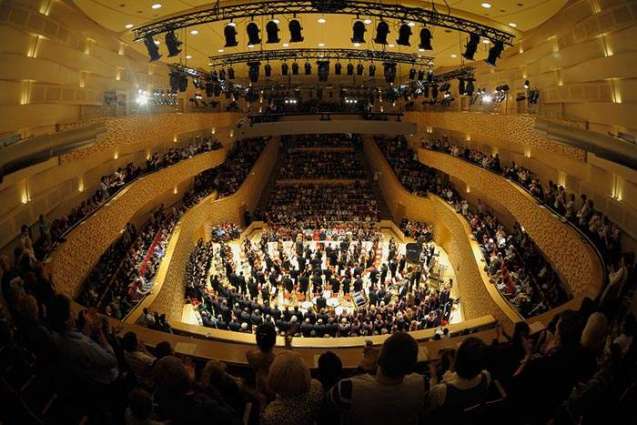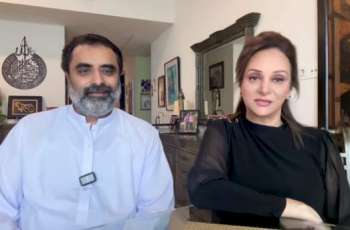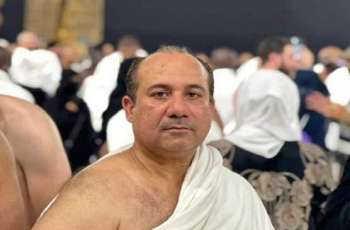The symphony orchestra of the St. Petersburg State Music Hall Theater charmed the Italian audience performing excerpts from the works by Italian composers of the XVIII century on the musical instruments that were gifted to the composers by Russian Empress Catherine the Great.
MOSCOW (Pakistan Point News / Sputnik - 09th October, 2018) The symphony orchestra of the St. Petersburg State Music Hall Theater charmed the Italian audience performing excerpts from the works by Italian composers of the XVIII century on the musical instruments that were gifted to the composers by Russian Empress Catherine the Great.
The Northern Synfonia orchestra went on a tour to Italy on October 5-7 as part of the Russian Seasons international project. The orchestra performed excerpts from the works Italian composers Giovanni Paisiello and Domenico Cimarosa wrote while working as court musicians in St. Petersburg.
STORY THAT GOES BACK TO CATHERINE THE GREAT
Italy, which hosted the Russian Seasons project this year, has the "deepest historical ties of all" with Russia, Fabio Mastrangelo, the artistic director of the St. Petersburg State Music Hall Theater, who was the architect of the project's concept along with RAI correspondent in Russia Marc Innaro, stressed in an interview to Sputnik.
The project hearkens back to the time of Catherine the Great, according to Mastrangelo, who also conducted the concerts.
"Being the illuminated leader [Catherine] was, she surrounded herself with extremely interesting and talented individuals. Among them two Italian composers: Giovanni Paisiello and Domenico Cimarosa. During their respective long-term stays in Russia, in St. Petersburg, they composed a number of operas which were immensely appreciated by the Tsarina," Mastrangelo said.
Catherine the Great gave Cimarosa and Paisiello two harpsichords as a sign of her appreciation and gratitude. The composers shipped the empress' gifts back to Italy with the rest of their belongings when they returned home.
The Northern Synfonia orchestra along with singers from both Italy and Russia thrilled the Italian audience with two performances in the Court Theatre of the Royal Palace of Caserta and in the Naples Conservatory of San Pietro a Majella, which had restored and carefully preserved the instruments.
Mastrangelo emphasized that the concerts in Italy received an extraordinary amount of media attention and were a great success, which, he was convinced, could be repeated once again in the Hermitage Theater of St. Petersburg in November, where the Northern Synfonia orchestra would perform the same program.
Mastrangelo, who is often referred to as Russia's most famous Italian-born conductor, also found himself in the spotlight of the Italian media. On Sunday, in his hometown of Bari he received the highest award of the city Merito della Republica Citta di Bari for extraordinary achievements in promoting the Italian culture worldwide and for the significant role he played in the city's cultural life.
Incidentally, the name of the festival, "Russian Seasons," references yet to another important moment in the history of Russian-European cultural ties: Sergey Dyagilev's renowned "Russian Seasons" tour, which featured performances by Russian ballet and opera artists at the beginning of 20th century in Paris. The contemporary festival was modeled after Dyagilev's project which brought the Russian culture to Europe.
The recent performances of the symphony orchestra of the St. Petersburg State Music Hall Theater in Italy, which used rare musical instruments of the XVIII century, became "an important occasion in cultural life of both countries," Pietro Folena, the president of the Italian cultural association MetaMorfosi, told Sputnik.
"I believe that the Russian orchestra led by Fabio Mastrangelo showcased the best [of] what Russia has to offer in terms of culture and music. This unique project, I am sure, is an important occasion in cultural life of both countries," Folena told Sputnik.
The "Russian Seasons" project showcased almost every aspect of the Russian culture, the president of the association, which sponsored the performances, added.
Folena emphasized that it was important to continue this "wonderful initiative" by transforming it into a cultural alliance between two countries.
"My dream is to organize next year in Naples a big exhibition of Russian artists, poets and musicians who fell in love with the Italian city of Naples praising its beauty in paintings, music or poetry," he added.
The performances were prepared in cooperation with the Hermitage Theatre and the Naples Conservatory. The "Russian Seasons" festival will last until December and will be held in more than 70 Italian cities. The program includes concerts, theatrical and ballet performances, circus shows, exhibitions, and film screenings.
The participants include Bolshoi State Academic Theatre of Russia, the Mariinsky State Academic Theatre, the Russian State Pushkin Academic Drama Theatre (Alexandrinsky Theatre), the Vakhtangov Academic Theatre, the State Hermitage Museum, the Schusev State Museum of Architecture and others, according to the festival's organizers.
ST. PETERSBURG CULTURAL FORUM MAY HELP KICK-START RUSSIA-EU DIALOGUE
The cultural initiative comes amid the strain in Russian-EU relations. The European Union has imposed sanctions against Russia over the 2014 referendum in Crimea where over 90 percent of those who voted chose to rejoin Russia. The vote was not recognized by Kiev and Brussels, although Russian officials have stressed that it was held in compliance with the international legal framework.
The relations have also been marred by a series of allegations of Moscow's subversive activities in various EU countries, most recently, in the Netherlands. Moscow has strongly refuted such accusations, stressing that it did not interfere in other states' affairs.
According to Folena, a former politician, the cultural ties between Moscow and Rome have never been broken but the fact that Russia is often portrayed in a wrong way affects all aspects of the bilateral cooperation.
"Europe needs to change its stand towards Russia. Russia is a part of the European civilization. For me, Paisiello and Cimarosa as well as Catherine The Great are part of the great European culture. We have many aspects to this common culture but we are all Europeans, it is unwise to build new walls between us," Folena said.
The association president added that he was convinced that the next Saint Petersburg International Cultural Forum, scheduled for November, could give a fresh start to the dialogue between Russia and Europe.




